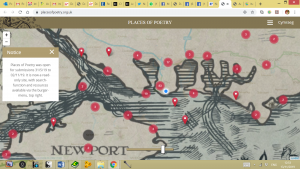William Sutton's Blog, page 8
April 15, 2020
Guilt Written, Short Story
“Mikey asked to see the editor. Glasses from a charity shop, head shaven: the secretary didn’t recognise him. Nor the editor. Just as well; she’d have fired him.
Unfortunately for her, he fired first.”
My story Guilt Written appears on Matt Wingett‘s Decameron Days project. You can read the whole sorry thing here.
‘Guilt Written’ was placed in the Federation of Writers Scotland’s Vernal Equinox Competition and featured in their High Tide anthology (2019).
What is Decameron Days?
As Matt’s website explains,
Boccaccio’s Decameron is a story of escape from the horrors of now into the realm of the imagination. His book, The Decameron (literally meaning “ten days”), is a delightful collection of funny, bawdy, wry, silly and romantic tales that keep people’s spirits lifted during dark days.
Although we can’t flee to the countryside – we can escape to the internet. I invite you – readers and writers – to join me and help to lift each others’ spirits.
On this site I invite you to share your story, your tale. Let’s keep it uplifting, let’s keep it joyous – though of course we can have some shadow in the light.
Please Feel Free to Share:








March 31, 2020
Typewriter Tales: Mad Hatter’s Typewriter Party (@PompeyBookfest 2020)
(Next outing Portsmouth #Darkfest2020 – if we’re allowed out)
Thanks to amazing creative participants, and to wonderful @SouthseaCoffee staff for making it possible. Especial plaudits for Elizabeth Staples’ beautiful artwork. Hope to distribute ZINE via Pigeon Books, when we’re released.
[Original BLURB for event:
Do I need to know anything?
No. Just write your own revolution at this drop-in workshop, brought to you by T’Articulation and me.
Do I need to be an experienced writer?
No! We’ll help, with prompts or suggestions, or by just giving you a bit of space: Create a postcard sized story, poem or drawing.
Mad Hatter’s Typewriter Party: March Hares & Dormice in Your Teapots
Wednesday 4 March 3pm-5:30pm Southsea Coffee in Portsmouth Bookfest 2020]
Please Feel Free to Share:








February 26, 2020
Mad Hatter’s Typewriter Party Portsmouth Bookfest 2020
Do I need to know anything?
No. Just write your own revolution at this drop-in workshop, brought to you by T’Articulation and me.
Do I need to be an experienced writer?
No! We’ll help, with prompts or suggestions, or by just giving you a bit of space:
Create a postcard sized story, poem or drawing.
Mad Hatter’s Typewriter Party: March Hares & Dormice in Your Teapots
Wednesday 4 March 3pm-5:30pm Southsea Coffee, 63 Osborne Road, PO5 3LS in Portsmouth Bookfest 2020
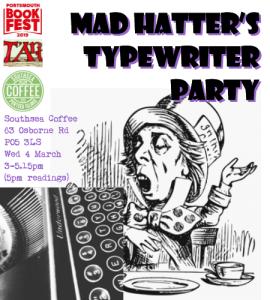
FREE- No ticket required
Typewriters – have you ever used one?
There are also quills, inks, rubber stamps for the messy-fingered artists among you.
No experience required.
All ages and abilities welcome.
Readings with our creative friends at 5pm-ish.
It’s FREE and there’s no ticket required.
This was our last outing:
and watch out for Typewriter Tales #7 in Portsmouth DarkFest November.
Please Feel Free to Share:








February 14, 2020
A Curious History of Sex
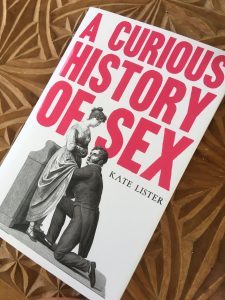
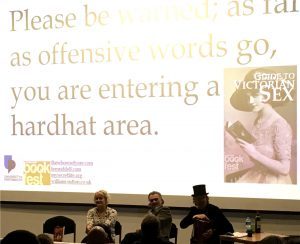
She’s interviewed one minute into today’s Valentine’s edition of Woman’s Hour:
https://www.bbc.co.uk/sounds/play/m000f7xn
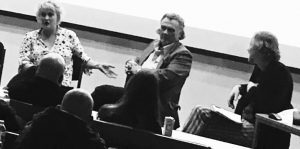
And reviewed robustly and favourably here in the Guardian.
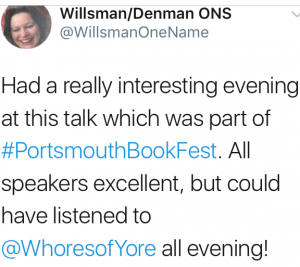
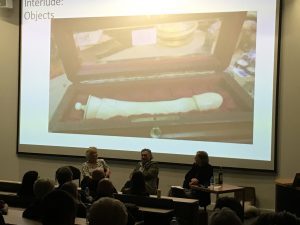
‘Buckle your trousers, fasten your seatbelts, here comes Kate Lister. Her curious history of sex is a wild ride, made all the more enjoyable by a wonderfully irreverent approach. If she ever tires of being an academic historian she might try stand-up comedy. I ve never had so much fun learning stuff’ The Times
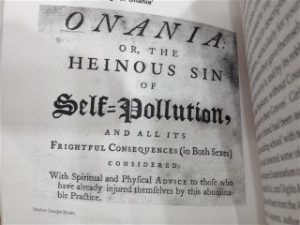
Please Feel Free to Share:








February 7, 2020
The Song I Cannot Sing
The Song I Cannot Sing
Why can some songs not be sung? Answers on a postcard, please, as you come along to my melody-wrenching, heart-tapping, grief-ridden. Ask yourself: what songs make you weep? Why? Let’s harness the redemptive power of words and music to bridge over your own troubled waters. Coming to a festival near you soon. f/williamgeorgeq t @WilliamGeorgeQ

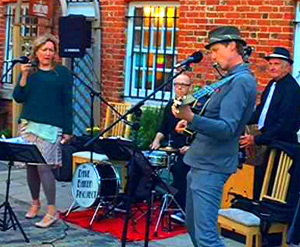
“Welcome to The Song I Cannot Sing: and depending on how we get on, at the end of the show, I’ll sing a bit of it. I might. I might not. At age 25, I wanted to sing, but I gave up. The reasons I’ll explore throughout the show, but one was stumbling on a song I could not sing. I’ll tell the story of that song: a story I haven’t told; but I have to tell, or else remain a four year old, trapped in loss & grief.”
Why can some songs not be sung? What are the reasons? The audience can suggest answers to help me find the real reason.
Do songs make you weep?
Follow my travels through singing lessons, songwriting studies, performances disaster and novelistic ambitions. I’ll assemble a panel of song titles for the audience to choose from, as I travel through death songs and death poems I’ve gathered over the years, discuss how I’ve learned to sing with an open heart, and seek out that song I cannot sing.
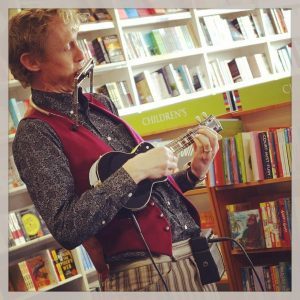
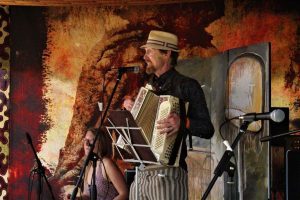

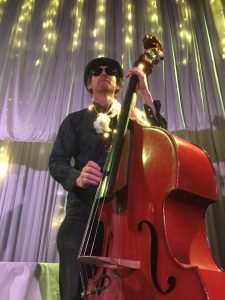
Please Feel Free to Share:








January 24, 2020
Clean Minds, Dirty Books
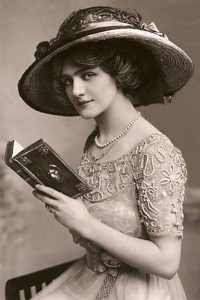
Clean Minds, Dirty Books
From Historia Magazine
What’s the dirtiest book you’ve ever read? Writers’ research can lead to awkward places. “Oh yes?” says my wife, glimpsing a passage of Walter’s My Secret Life on my screen. “You’re ‘researching’ again, are you?”
Private Case, Public Scandal by Peter Fryer was the peculiar tome that pointed me to the explosion in the Victorian erotic book trade and the penumbrous underworld of the mysterious Walter.
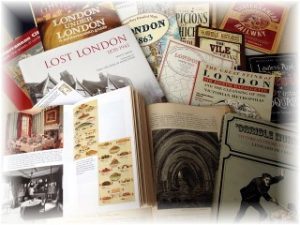
When we write about the past, we pack moral conundrums into tidy boxes. We pat ourselves on the back for our progressive thinking: here are things we no longer condemn; here are outrages we wouldn’t countenance today. For example, we don’t confiscate erotic literature; we do lock up sexual predators. Yet morality shifts with time. The morality of sex and writing about sex is especially mutable. The more I’ve researched Victorian erotica and prostitution, the more uncertain I’ve become.
I began with only a cursory knowledge of Victorian erotica (periodical The Pearl) and prostitution (from Henry Mayhew’s London Labour and the London Poor). One of my characters is an erotobibliomaniac. I began listing erotic classics through the ages. Peter Fryer’s Private Case, Public Scandal discusses the long tradition of erotica. De Duobus Amantibus (About Two Lovers) was a bestseller, to the discomfort of author Aeneas Piccolomini when he became Pope Pius II. In 1524 I Modi (The Sixteen Pleasures) paved the way for illustrated sex guides. Other hits include Sodom or the Quintessence of Debauchery, Erotopolis, and Fanny Hill.
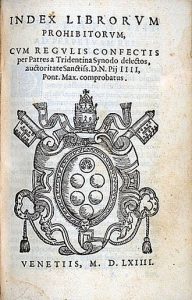
My era, the swinging 1860s, was particularly fruitful. Two proofs of this erotic explosion? Legislation and collectability.
The Obscene Publications Act 1857 suggests moral panic. Lord Chief Justice Campbell called pornography “a poison more deadly than prussic acid” (an analogy used to condemn subsequent books, such as 1928 lesbian novel The Well of Loneliness). Even at the time, the bill was contentious. Beside the crazes of sensation fiction and new-fangled detective fiction, erotica offered illicit titillation.
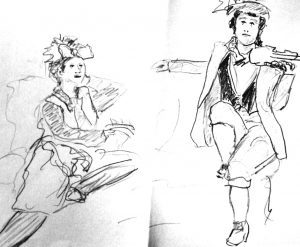
Was this law enforced? Erotic publishers William Dugdale and John Camden Hotten had books seized, premises closed. I had fun writing a scene where my detective visits the infamous Holywell Street (pictured above, promptly demolished). Sergeant Lawless threatens arrest to elicit information about their sources.
Was erotica really seized and its purveyors imprisoned? Well, Hotten began presenting new books such as Lady Bumtickler’s Revels as reprints, thus less inflammatory. (My editor and I argued over genuine publication dates for Rosa Fielding, Victim of Lust.) Mingling commercialism with salacity, Hotten’s business thrived (becoming Chatto & Windus.) Dugdale died in the Clerkenwell House of Correction, deprived of books.
Collecting. Collectors began publishing clandestine lists of erotica, notably the Index Librorum Prohibitorum by Pisanus Fraxi (pseudonym for Herbert Ashbee, the Latin for “ash-bee” – “fraxinus-apis” – erogenously rearranged).
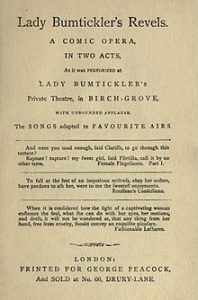
Simultaneously the British Museum Library established its Private Case, following the example of the Naples Museum’s Camera Secreta, to house erotic works. Peter Fryer suggests that the Library accepted these 15,229 works in order to secure Ashbee’s first editions of Don Quixote: a fascinating deal. A later head librarian said, “We are keepers of books, not morals.”
Fryer’s Private Case, Public Scandal (1966) is partly detective work to unearth the clandestine works excluded from the Library catalogue. It is partly protest: requesting such books, he was interviewed to ascertain whether he was a suitable applicant. Today’s BL website declares: “Special conditions have been removed; a few individual items are restricted owing to value or fragility.” Rumour has it that there are still items only viewable in private rooms, watched by a librarian.
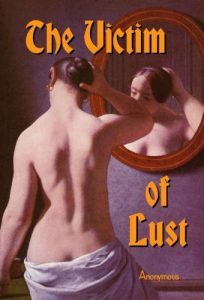
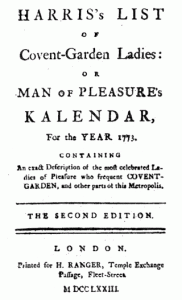
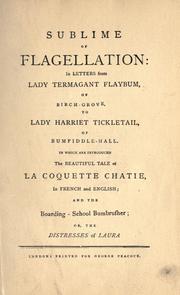
I dipped into many such novels. From Phoebe Kissagen to The Adventures of an Irish Smock by Terence O’Tooleywag, I found recurring tropes, familiar from Mayhew’s insightful interviews: country girl seduced by city toff; ruination upon vain promise of marriage; prostitution; or transformation into a lady.
Mayhew laments these immoral daydreams:
The ruin of many girls is commenced by reading the low trashy wishy-washy cheap publications…about the sensualities of the upper classes…in the habit of imbibing for maidens of low degree “whose face is their fortune”.
Though at times lamenting their prose style, I was impressed by their creative perversity and sense of fun. Who can forget, in Rosa Fielding, the Fukkumite islanders and their crotchless underclothing?
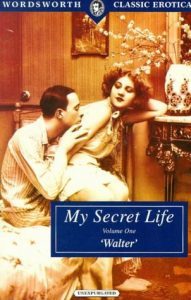
But it is magnum opus My Secret Life that scales heights of perversity and depths of degradation. This is the book guaranteed to embarrass anyone reading it over your shoulder on the train. It’s hard to read without judgement. Even Judith Flanders, Victorian scholar extraordinaire, is apologetic about Walter’s epic. By turns racy, turgid, obsessive and perverse, it is one of the dirtiest books you’ll read, yet an extraordinary source of Victorian life and language.
The mysterious ‘Walter’ was a gentleman obsessed by sex. His identity is still debated (Ashbee the most convincing candidate). Today we would call him a sex addict. He documents his manifold encounters over the mid Victorian decades. His memoir was privately published in eleven volumes from the 1890s.
My Secret Life differs from erotic fiction in its attention to detail, its unromanticised presentation of everything from chamber pots to brothel negotiations to sex. It mingles the sensual and the sordid, romantic trysts and coercion that is reprehensible, if not criminal. Walter’s repeated forcing of cooks, cousins, ladies and prostitutes makes for uncomfortable reading.

Yet he recounts rebuffs as often as conquests. He tells of teenage years peeping up skirts; of jealousy seeing prostitutes with other men; of disgusting hours in French toilets; of longing for cocottes and countesses; and of love.
De Sade may shock, but he intends to; Apollinaire and Henry Miller are irrepressible; Batailles delights in degradation. Yet Walter’s degradations are full of pathos, the ecstasies touching. My Secret Life feels too detailed to be fiction. Whether all true, all fantasy, or somewhere in between, we will never know.
His unflinching honesty fascinates, outstripping those well-known debauchers Dickens and Wilkie Collins. Walter paves the way for socio-sexual memoirs from Anais Nin to today’s confessionals, Belle de Jour, Paid For and Diary of a Call Girl. Biographers delve into Dickens’ infidelity, as well as his novels, to evaluate Victorian mores. Walter’s anecdotes place Little Emily’s ruination in a wider context; they make Collins’ eccentric matrimonials seem commonplace, and Lady Audley’s secret less shameful.
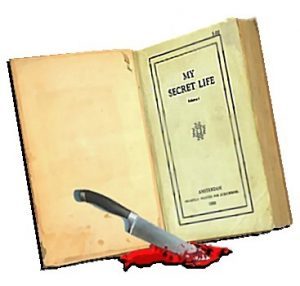
These are hints of a grimy underworld all “flash gents” knew but few wrote of. When Mr Hyde is seized for “trampling” a girl, Stevenson’s knowing readers knew he meant attempted rape. Trafficking caused another panic. Mayhew lamented the “disgraceful, horrible and revolting importation of girls into England”. Journalist WT Stead in the Pall Mall Gazette wrote about buying a thirteen-year-old girl, an exposé recognisable years later to Pygmalion’s audience. Walter’s portraits include such girls, prostituted by friends, sisters and mothers.
Yet he also tells of Yellow-Haired Kitty, insisting she was no prostitute but sold herself for “pies and sausage-rolls”; Camille, the quiet French prostitute who enjoyed telling him of lesbianism and sodomy; and every class of encounter from penurious alleyway gropes to persuasively lecherous travelling ladies. Walter considers any woman fair game. Now, in Collins’ Armadale, I can read into the hero’s wooing of Miss Milroy the same shadow of ruination that Walter senses seeing a woman drop her handkerchief in the street.
I’ve tried to imbue my Victorian streets with this sense of moral relativity: the sliding scale between the lady seeking marriage and the street woman seeking trade.
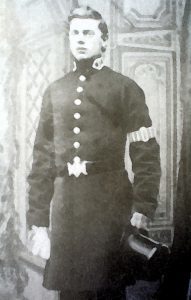
When your research shocks, you’re researching the right areas. In Lawless and the Flowers of Sin, I’ve explored the creation of the Private Case and My Secret Life, and the relationship between erotica and prostitution. Our preconceptions of the Victorians are wrong: they are not prudish, but as dirty-minded as any era.
The moral issues confound me more than ever. I’d love to consign Walter’s behaviour to the past. I’d love to believe pornography has no link to disrespect and coercion. But I wonder. I wonder if today’s socio-sexual scandals have the same basis as Walter’s behaviour: sexual inequality; financial inequality; male impunity; collusion in laying blame on women.
I distrust censorship. The BL’s Private Case seems laughable today. But the panic behind it was real – as real as our fears about internet safety. Walter defended his amatory memoir as rekindling his own pleasure while offering inspiration to sensual adventurers. But those adventurers enjoyed the impunity of a time when prostitutes were dispensable, the poor inconsequential, and wives their husbands’ chattels.
The Georgians feared gothic novels’ immoral influence, the Victorians sensation fiction and erotica. Reading is today elevated to a moral good. Instead, we ask if computer game violence leads to killing sprees. We blame outrages like the Stanford rape on imbecilic internet pornography. Moral panics shift.
Yet I wonder if we’re right to worry. Today’s sexual mores can still surprise, even shock. Thought censorship cannot resolve anything, internet sites and computer games reflect how we are, just as the values of literature reflect society. And, however we congratulate ourselves, our society remains not so different from Walter’s.
Lawless and the Flowers of Sin, by William Sutton, is published by Titan Books.
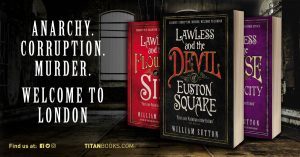
British Museum, Erotica, John Camden Hotten, My Secret Life, Prostitution, Victorians, Walter, William Dugdale, William Sutton
Please Feel Free to Share:








November 13, 2019
Places of Poetry includes Pompey
“Although many arts projects are criticised for being London-centric, Places of Poetry poems are widely scattered. Some surprising cities and towns, such as Portsmouth and Stoke-on-Trent, emerge as hives of poetic activity.”
Places of Poetry project invited poets nationwide to drop poetry pins on to the map of Britain. Write Out Loud blog noted, with some surprise, that unsuspected places such as Portsmouth were highly lit up.
Pompey poets were not surprised.
Please Feel Free to Share:








November 7, 2019
Write Your Novel Creative writing workshops
Portsmouth Bookfest – latest event update here.
Saturday 22nd February, 29th February, 7th March, 14th March
10.30am-12.15pm, University of Portsmouth Eldon Building (1.09, First Floor),
£30 for the 4 sessions (Concessions £10) – 25 places: book early to avoid disappointment.
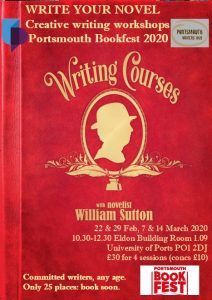
From idea to publication: poisoned pens, razor-sharp descriptions.
Workshop series to develop your novel.
Sign up for these brilliant sessions run in a friendly, informal atmosphere by an internationally published author. Set realistic aims, explode myths – and write.
Will I have to read aloud?
No. You can discuss ideas, problems, even sentences, but you don’t have to.
Will I have to write?
Yes, you’ll be given prompts to get you going, but the pace and direction of the work is yours.
Gain a clearer idea of how to write your book, whether fiction, autobiography, or non-fiction. How will you tell your story? We’ll discuss planning, writer’s block, procrastination, and publishing options.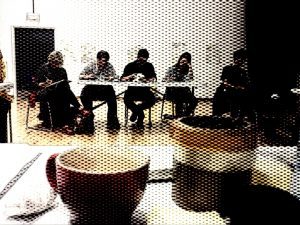
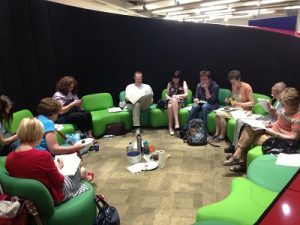
FOUR SESSIONS, covering:
· Beginnings, Ideas;
· Plot;
· Characters, Settings;
· Edits, Selling.
Committed writers, all ages.
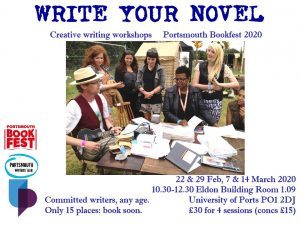
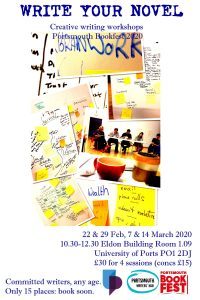

Please Feel Free to Share:








Typewriter, Treason and Plot (Typewriter Tales #5) #DarkFest19
Typewriter, Treason and Plot (Typewriter Tales #5)
Thanks to the wonderful people at Southsea Coffee for welcoming us again. Such a lovely group of oddballdom and typographicality. Thanks to collaborators Christine Lawrence & Amanda Garrie of T’Articulation Events, and to Victoria Leslie for typewriters, to stalwarts Sue Shipp, Irene Strange & Gareth Toms for creativity, to newcomers and to those who didn’t expect to be participating in a creative workshop when they popped out for coffee.
#DarkFest19 supernaturalcities.co.uk #Darkfest2019 Programme
See you all in the New Year at #Bookfest 4 March for Mad Hatter’s Typewriter Party (Typewriter Tales #6):
https://www.facebook.com/events/35621...
Please Feel Free to Share:








October 22, 2019
Dark Side/Port Side Launch Success (via Supernatural Cities)
Reposted from Mel Bassett’s post supernaturalcities.co.uk/2019/10/22/dark-side-port-side-launch-success
Dark Side/Port Side Launch Success
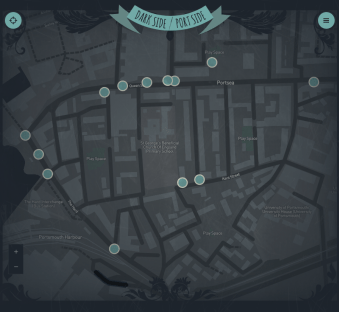 Last night witnessed the launch of Dark Side/Port Side; an exciting interactive online tour of Portsmouth’s murky past through contemporary word and film. The app was the brainchild of John Sackett, Creative Director of events company Big Adventures who, with the support and part-funding of the Supernatural Cities and Port Towns and Urban Cultures projects at the University of Portsmouth, successfully secured a grant from Arts Council England.
Last night witnessed the launch of Dark Side/Port Side; an exciting interactive online tour of Portsmouth’s murky past through contemporary word and film. The app was the brainchild of John Sackett, Creative Director of events company Big Adventures who, with the support and part-funding of the Supernatural Cities and Port Towns and Urban Cultures projects at the University of Portsmouth, successfully secured a grant from Arts Council England.
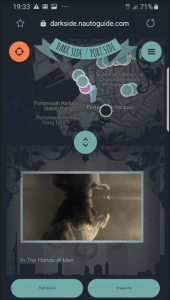 ‘In the Hands of Men’, one of the fourteen points on the tour
‘In the Hands of Men’, one of the fourteen points on the tour
The route is peppered with fourteen points which can be geo-located through the user’s smart phone. Each point on the walk reveals a stunning vignette showcasing artistic interpretations – in film, song, spoken word, and multimedia imagery – of an aspect of the location’s dark past as a Royal Navy port and a hub of iniquity.
Intrepid explorers using the tech last night saw films inspired by mudlarking, a famous Portsea murder, eerie tales of childhoods and motherhoods living in poverty, women whose lives were constrained by their gender, and a sailor slang argument.
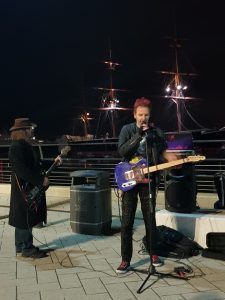 Desperate Beauty and Jay Groovara
Desperate Beauty and Jay GroovaraThe launch also featured a few surprises. DarkFest musician-and-author-extraordinaire Will Sutton whipped up morale on a cold October night by engaging us all in a music hall-style singalong. Then, embodying the ‘Spirit of Portsea’, author Matt Wingett recounted the militarism and working men of the Dockyard, the ‘blood and the fighting’, the mothers and the molls, and other upheavals the town had seen in the last three centuries. On the Hard, with HMS Warrior (1860) as a spectral backdrop, Desperate Beauty and Jay Groovara played a mini-concert.
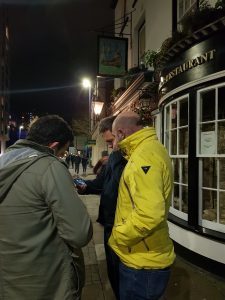 We lingered outside pubs and in alleyways. Alongside some of Portsmouth’s most iconic landmarks
We lingered outside pubs and in alleyways. Alongside some of Portsmouth’s most iconic landmarksDark Side/Portside is available throughout #DarkFest19 at https://darkside.nautoguide.com/. The first point on the map is outside St George’s Church Portsea, PO1 3AT. The walk is flat and easily accessible – do watch the traffic though! It is recommended that you wear headphones, have your phone fully charged, and make sure that you are mobile data rich!
Dark Side/Port Side was inspired by the Sailortown walking tour of Portsea and Old Portsmouth which was created using research from the University of Portsmouth’s ‘Port Towns and Urban Cultures’ project, including Dr Karl Bell’s research into Portsmouth’s supernatural side. We are delighted with the result as Dark Side/Port Side showcases the rich and innovative new ways in which local artists and filmmakers can interact with our academic research. Moreover, we are excited by the potential it has to encourage the wider public to learn more about Portsmouth’s past and its creative present!
Both Sailortown and Dark Side/Port Side were developed with Nautoguide, a SME who specialise in mapping data in ingenious and creative ways. Read more about their creative journey with the project HERE.
We value your feedback!
If you went on the tour last night, or you do go on it at some point in the near future please tell us about your experience. If we can demonstrate to different funding bodies how arts and humanities projects such as Dark Side/Port Side can inspire, inform, entertain, and generally be beneficial to our overall well-being, we will have a stronger case for doing more in the future.
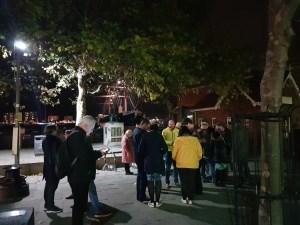 Intrepid explorers of Dark Side/Port Side outside the Historic Dockyard Gates
Intrepid explorers of Dark Side/Port Side outside the Historic Dockyard GatesGet in contact with us and tell us:
What did you previously know about the history of Portsmouth’s sailor town?
How has the app made you think about Portsmouth and its past?
In what ways did the poetry and films reflect the history of the city?
How did you feel a sense of place and time was evoked in the Dark Side/Port Side app and walking tour?
Which video and /or poem resonated with you most and why?
What did you learn about the dark side of “Portside” that you did not previously know about?
You can do this by cutting and pasting the questions in the Contact from at the bottom of this page, or downloading the “Please tell us what you think” Feedback Form, filling in and sending it back to us (scanned/photographed/typed) to supernaturalcities@port.ac.uk
Your comments will make a difference. Thank you!
Please Feel Free to Share:










